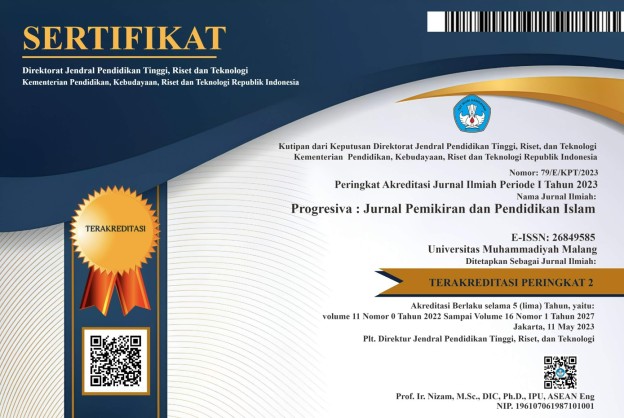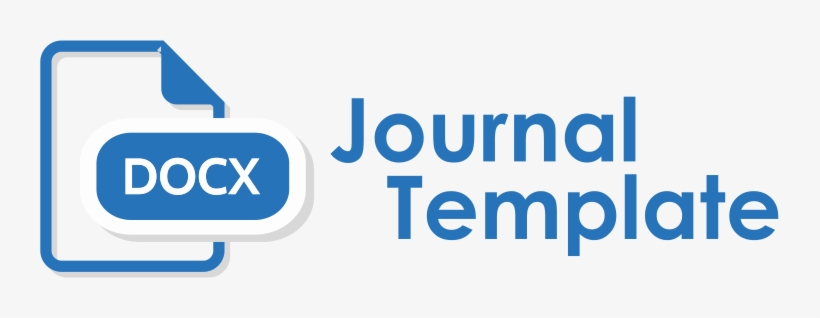The Relationship Between Data, Technology, and Humanism Literacy and Integrity in Lecturer Research Performance
DOI:
https://doi.org/10.22219/progresiva.v12i02.30165Keywords:
Humanism, Integrity, Literacy, Performance, TechnologyAbstract
In an era driven by technological progress, lecturers, as the main agents in academic research, are faced with the demand to understand and integrate data, technology, and human values into their research. The purpose of writing this article is to describe the research performance of lecturers based on the factors of data literacy, technological literacy, and humanism literacy, as well as the integrity of lecturers in higher education. This research method involves surveys and data analysis by a number of lecturers who are active in research in various scientific disciplines. This research method also uses a quantitative approach and a cross-sectional study design. Data was collected through a Google Form questionnaire distributed via WhatsApp. The research data was analyzed using multiple regression (OLS). This article contributes to an understanding of the importance of integrating data literacy, technology, and human values into lecturers' research approaches. The practical implication of this research is the need to develop training programs and institutional support to increase literacy and integrity in the context of academic research. The research results show that literacy and data integrity have a significant effect on lecturers’ research performance. Meanwhile, technological literacy and humanism literacy do not have a significant effect on lecturers' research performance. Lecturers’ research performance through the results of this research is influenced by variations in data literacy, technological literacy, humanism literacy, and integrity by 36.1%.
Downloads
References
, T. et al. (2012). Erratum. Design and Implementation, 5(4), 405. https://doi.org/10.1007/BF00276110
, S. (2013). Preface. 1st European Conference on Information Literacy (ECIL) Springer Communications in Computer and Information Science, 134-150, 397 CCIS(May). https://doi.org/10.1007/978-3-319-03919-0
Almgren, A. (2021). Using Multiple Linear Regression to Estimate Customer Profitability in Consumer Credits.
B, H. J. P., Amalia, N., Utami, R. D., & Jha, K. (2022). Proceedings of the 7th Progressive and Fun Education International Conference (PROFUNEDU 2022). In Proceedings of the 7th Progressive and Fun Education International Conference (PROFUNEDU 2022) (Vol. 1). Atlantis Press SARL. https://doi.org/10.2991/978-2-494069-71-8
Conroy, T. J., & Ehrensal, P. A. L. (2021). Values and the Ethics of Care: Four Portraits. Values and Ethics in Educational Administration, 16(1), 1–11.
Dressman, M. (2008). Using social theory in educational research: A practical guide. In Using Social Theory in Educational Research: A Practical Guide. https://doi.org/10.4324/9780203870518
Fortier, J., Potter, C., Grady, S., Lohr, N., & Klein, J. (1998). Wisconsin’s Model Academic Standards for Information and Technology Literacy. In Wisconsin Department of Public Instruction: Vol. Bulletin N.
Gujarati, D. (2013). Basic Econometrics. In The Economic Journal (Vol. 82, Issue 326). https://doi.org/10.2307/2230043
Haleem, A., Javaid, M., Qadri, M. A., & Suman, R. (2022). Understanding the role of digital technologies in education: A review. Sustainable Operations and Computers, 3(February), 275–285. https://doi.org/10.1016/j.susoc.2022.05.004
Haven, T. L., Tijdink, J. K., Martinson, B. C., & Bouter, L. M. (2019). Perceptions of research integrity climate differ between academic ranks and disciplinary fields: Results from a survey among academic researchers in Amsterdam. PLoS ONE, 14(1), 1–16. https://doi.org/10.1371/journal.pone.0210599
Henderson, J., & Corry, M. (2021). Data literacy training and use for educational professionals. Journal of Research in Innovative Teaching & Learning, 14(2), 232–244. https://doi.org/10.1108/jrit-11-2019-0074
Huberts, L. W. J. C. (2018). Integrity: What it is and Why it is Important. Public Integrity, 20(0), S18–S32. https://doi.org/10.1080/10999922.2018.1477404
Irajpour, A., Ghaljaei, F., & Alavi, M. (2015). Concept of Collaboration from the Islamic Perspective: The View Points for Health Providers. Journal of Religion and Health, 54(5), 1800–1809. https://doi.org/10.1007/s10943-014-9942-z
Jo Shan Fu, ., & Fu, J. S. (2013). ICT in Education : A Critical Literature Review and Its Implications. International Journal of Education and Development Using Information and Communication Technology, 9(1), 112–125.
Mardiana, H. (2020). Lecturers’ Adaptability To Technological Change And Its Impact On The Teaching Process. JPI (Jurnal Pendidikan Indonesia), 9(2), 275. https://doi.org/10.23887/jpi-undiksha.v9i2.24595
Md Ghazali, N. H. (2016). A Reliability and Validity of an Instrument to Evaluate the School-Based Assessment System: A Pilot Study. International Journal of Evaluation and Research in Education (IJERE), 5(2), 148. https://doi.org/10.11591/ijere.v5i2.4533
Mohamad Yunus, M. I. Bin. (2018). Good Governance According to Islamic Perspective. FIAT JUSTISIA:Jurnal Ilmu Hukum, 11(3), 200. https://doi.org/10.25041/fiatjustisia.v11no1.696
Mokhtari, H., & Shafitabar-Samakoosh, N. (2018). Some principles of information ethics from the Koran. International Journal of Information Science and Management, 16(1), 153–163.
Noer, M. U., Mokhtar, M., & Semmaila, B. (2019). Influence of Leadership and Work Ethos Through Islamic Work Motivation Toward Employee and Lecturer Performance in Foreign Language Academy of Universitas Muslim Indonesia-Makassar. 80(1), 110–137.
Ongena, G. (2023). Data literacy for improving governmental performance: A competence-based approach and multidimensional operationalization. Digital Business, 3(1), 100050. https://doi.org/10.1016/j.digbus.2022.100050
Prado, J. C., & Marzal, M. Á. (2013). Incorporating data literacy into information literacy programs: Core competencies and contents. Libri, 63(2), 123–134. https://doi.org/10.1515/libri-2013-0010
Qurtubi, A. (2023). The Impact Of Professionalism And Lecturer Competency On Lecturer Performance In Indonesia. Journal on Education, 05(04), 11485–11497.
Rayhan, A. (2022). How to Understand The Quran? Problemos, 101(September), 132–136. https://doi.org/10.15388/Problemos.101.11
Rokhman, W. (2022). Exploring the Implementation of Islamic Work Ethics Among Muslim Women Workers. 16(2), 347–374.
Salija, K., Muhayyang, M., & Rasyid, M. A. (2018). Interpersonal Communication : A Social Harmony Approach. http://ebook.unm.ac.id/?wpfb_dl=80
Santoso, A., & Cahaya, F. R. (2019). Factors influencing plagiarism by accounting lecturers. Accounting Education, 28(4), 401–425. https://doi.org/10.1080/09639284.2018.1523736
Saripudin, S., Sumarto, S., Juanda, E. A., Abdullah, A. G., & Ana, A. (2018). Understanding technology literacy: The characteristics of ICT literacy vocational teachers. International Journal of Engineering and Technology(UAE), 7(4), 182–185. https://doi.org/10.14419/ijet.v7i4.33.23555
Serrat, O. (2016). How Information and Communication Technology Can Fast-Track Development. November, 1–3.
Shrestha, N. (2020). Detecting Multicollinearity in Regression Analysis. American Journal of Applied Mathematics and Statistics, 8(2), 39–42. https://doi.org/10.12691/ajams-8-2-1
Sidhu, A., Bhalla, P., & Zafar, S. (2021). Mediating Effect and Review of its Statistical Measures. Empirical Economics Letters, 20(4), 29–40.
Suryadi, Mahardika, I. K., Supeno, & Sudarti. (2021). Data literacy of high school students on physics learning. Journal of Physics: Conference Series, 1839(1). https://doi.org/10.1088/1742-6596/1839/1/012025
Wiannastiti, M., Oktriono, K., & Simatupang, M. S. (2019). Digital literacy of ELT lecturers in different contexts: A case at two universities in Jakarta. ACM International Conference Proceeding Series, 515–519. https://doi.org/10.1145/3377713.3377805
Wolff, A., Gooch, D., Cavero Montaner, J. J., Rashid, U., & Kortuem, G. (2016). Creating an Understanding of Data Literacy for a Data-driven Society. The Journal of Community Informatics, 12(3). https://doi.org/10.15353/joci.v12i3.3275
Zhang, J. (2023). EFL teachers’ digital literacy: the role of contextual factors in their literacy development. Frontiers in Psychology, 14(July), 1–11. https://doi.org/10.3389/fpsyg.2023.1153339
Downloads
Published
How to Cite
Issue
Section
License
Copyright (c) 2023 Suharsiwi Suharsiwi, Fauzi, Laila Yumna, Rohimi Zamzam

This work is licensed under a Creative Commons Attribution-ShareAlike 4.0 International License.


















